Anthea Kerr Award
Jessica Singh

Jessica has helped the Department of Communities and Justice become a leading agency in the anti-racism space. She is a purpose-driven and people-centred leader, who champions anti-racist culture and initiatives across her department.
Jessica helped to establish the DCJ Anti-Racism Unit, which she now manages. She also played a fundamental role in the development of the DCJ Anti-Racism Strategy, is the Chair of the DCJ Multicultural Employee Resource Group and is a standing member of the DCJ Anti-Racism Taskforce.
Samantha Walters
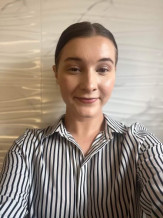
Samantha is a passionate advocate for young people with disabilities and adolescents facing significant challenges. She works tirelessly for the betterment of children in out of home care, ensuring they have a voice and are seen, heard and respected by the community.
She leads as young person without a management position, is a role model to her peers and is known for going above and beyond for the most vulnerable children of NSW.
Stephanie Dunstall
Stephanie is passionate about improving palliative and end of life care education across NSW.
Stephanie conducted a needs analysis and surveyed Nurse Unit Managers and Clinical Nurse Educators across the MLHD to identify knowledge gaps. Using this data, she has crafted a continuous program of education for district-wide clinicians. Over 600 clinicians across MLHD have attended palliative care education sessions in the first four months of 2024 alone.
Stephanie also works with external organisations to build capacity within the aged care sector, and the Murrumbidgee Primary Health Network to identify and promote education opportunities more broadly.
Tara Reynolds
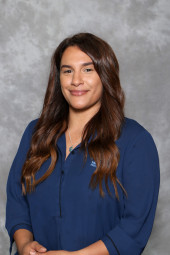
Tara’s leadership has inspired her team to become leaders themselves.
During the COVID-19 pandemic, like many schools, James Meehan High School suffered from low attendance, behavioural problems and disengagement. To address these issues Tara and her team devised a groundbreaking interdisciplinary curriculum, that seamlessly merges diverse disciplines to enhance student engagement and achievement.
Tara’s innovative approach not only challenged her team but also inspired them to embrace change and step beyond their comfort zones. The result is a curriculum that not only addresses the immediate issues but also prepares students for the complexities of the modern world.
Terri-Lee Ferreira
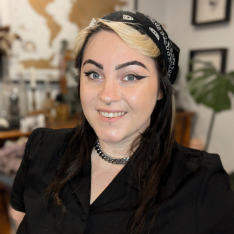
Terri has a passion for the public sector and serving the community. She prides herself in ensuring people are at the heart of everything she does. She joined Sydney Metro 2 years ago after transitioning from her frontline position as a train guard.
Since then, she has been at the coalface of developing and improving the Sydney Metro mobile community engagement van and the Sydney Metro Connect app. These innovative engagement tools improve connection with diverse communities.
Terri’s strength lies in not only the delivery of allocated tasks but improving systems and processes for the greater good of the organisation and community.
NSW Public Servant of the Year
Bernadette Brady
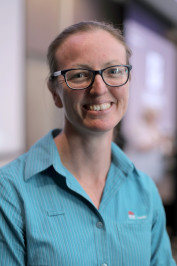
Bernadette leads a team to deliver high-quality care to people with chronic pain through the district-wide Pain Service. Her clinical initiatives have advanced equity in pain management by redesigning pain services to respond to the needs of culturally and linguistically diverse (CALD) communities.
She has partnered with diverse consumers and clinical teams to improve the uptake of chronic disease management among CALD communities. This work has led to teams improving cultural responsiveness and advancing health equity for vulnerable communities.
Bev Lazarou
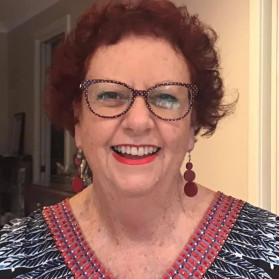
Bev is a highly respected leader in the NSW domestic, family and sexual violence sector, with over 30 years’ experience. Bev has provided support, mentoring and guidance to countless frontline staff who assist women experiencing DFV across the state.
She has worked tirelessly to ensure women experiencing violence have access to specialist support when they report or seek help at NSW police stations through the co-location pilot program. Bev works collaboratively across agencies to keep women and their children safe.
Bradley Lawder
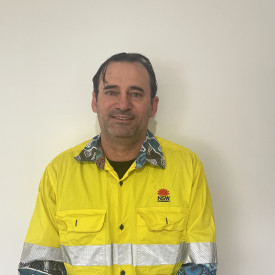
Brad is a strong advocate for the safety and wellbeing of frontline regional road workers at Transport for NSW. He has driven several safety and process advancement initiatives to improve the experience of lone, regional workers.
Brad is a trusted and proud advocate of mental health awareness. He pro-actively led the trial of the Guardian Angel Safety Systems program, supporting road workers to stay connected when working in remote locations. Brad is also a local volunteer first responder during emergencies and disasters in the Port Macquarie community.
Professor Nadia Badawi AM
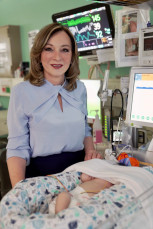
Nadia is an international authority on newborn brain injury and cerebral palsy, renowned for her research on the outcomes of neonatal intensive care. She is known for bringing diverse teams together to improve outcomes for the most vulnerable newborns across the state.
Her work has led to a marked improvement of survival in intensive care and a significant drop in the rate and severity of cerebral palsy in NSW over the past 20 years.
Associate Professor Naomi Hammond
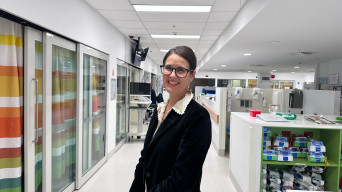
Naomi has over 11 years of dedicated service as a clinical nurse researcher. She has an impressive record of leading research that has transformed care for critically ill patients.
Pushing the boundaries of critical care research to tackle key issues in patient care, Naomi collaborated on a ground-breaking research program, leading a world-first study on fluid resuscitation practices covering 27 countries. The research findings have transformed practice and improved patient outcomes.
Scott Morgan
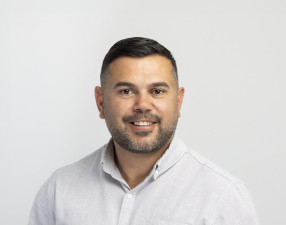
Scott is an innovative Gamilaroi Aboriginal leader and has been instrumental in driving innovation and change for the delivery of tangible outcomes for Aboriginal communities in the Illawarra Shoalhaven region.
He is dedicated to ensuring the department designs and delivers culturally informed practice that make a difference in the lives of Dhawaral and Yuin Aboriginal people. Scott collaborates across sectors and across projects to ensure positive progress is achieved.
Building a resilient economy
Asset AI
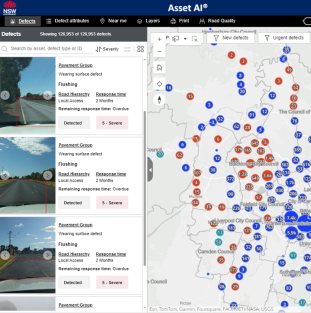
There is limited real time data on the condition of the 185,000km of road in NSW.
Asset AI is an Australian first. Cameras and sensors are fitted to council vehicles to capture footage of roads. A centralised platform viewable by Councils and Transport for NSW escalates defects in the roads based on severity and safety risk. The AI will draw on other data, like weather and traffic patterns, to predict road issues before they arise.
The use of data collected via vehicles already active on the road network provides significant time and cost savings for councils. Asset AI is used by 5 councils in NSW with 4 councils in line to be onboarded and over 40 more expressing interest in using the platform.
Partners: Institute Public Works Engineering Australasia NSW & ACT, Canterbury-Bankstown Council and Deloitte
Building a strong Aboriginal business sector
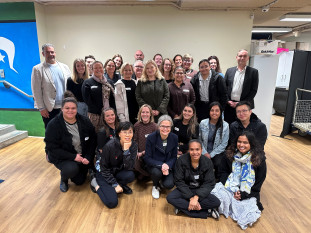
The Roadmap for Aboriginal Business Growth was developed to leverage economic advancement to improve life outcomes for Aboriginal communities.
This project was supported by $10 million to drive growth for Aboriginal businesses. It has delivered 3 Aboriginal Business Roundtables, bringing together Aboriginal businesses with Ministers and senior public servants to focus on how NSW can support Aboriginal businesses in contributing to the NSW economy. This has fostered trust-based relationships and opportunities for policy improvements to support a more resilient Aboriginal business sector.
The project focused on providing high-quality service to the Aboriginal business sector, centring people in the sector by listening, adapting, and collaborating.
Partners: NSW Coalition of Aboriginal Peak Organisations
Decarbonising Infrastructure in NSW
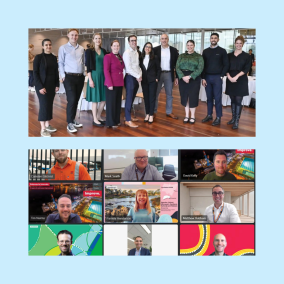
The construction sector is estimated to be the largest emitter of greenhouse gasses. For NSW to reach its carbon emission reduction target of net zero emissions by 2050 lowering these emissions is critical.
To drive change, Infrastructure NSW and Transport for NSW partnered to develop and deliver a holistic decarbonisation roadmap, co-created with industry and underpinned by policy and international leading construction standards.
The NSW Decarbonising Infrastructure Delivery Roadmap has fundamentally changed how NSW (and other jurisdictions) deliver infrastructure – setting a new construction industry benchmark across Australia and internationally.
Uptown District Acceleration Program
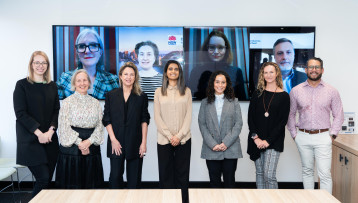
A 2017 study identified $16 billion in unrecognised economic benefit within the Greater Sydney night-time economy. Unlike other global cities, Sydney’s metropolitan area is geographically dispersed.
The Uptown Program empowers local businesses to collaborate with their neighbours to create vibrant going-out districts, promoting and maximising the diverse, multicultural and unique going-out experiences that Greater Sydney has to offer. It leverages the economic potential of new flexible working arrangements, where people are choosing to spend their time and money in their local areas.
Over 20 unique and coordinated districts have been developed across Greater Sydney. These districts reported increases in foot traffic, partnerships and sales.
Partners: Create NSW
Connecting communities
Digitisation: Records of Stolen Generations
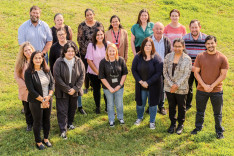
In 2016, the NSW government received 35 recommendations in the Unfinished Business Report into Reparations for the Stolen Generations. In 2020, joint work by Aboriginal Affairs NSW and Museums of History commenced to address recommendation 25 relating to the accessibility and usability of records relating to the Stolen Generations.
Over a period of 19 months, Museums of History created 150 terabytes of digital resources, including 1.2 million digitised images and 358,000 entries describing names and geographical places.
A knowledge bank was created throughout the project to assist interpreting cursive handwriting which included names of board members, managers, welfare officers and other impactful entries.
Partners: Aboriginal Affairs NSW and Department of Communities and Justice
FrogID
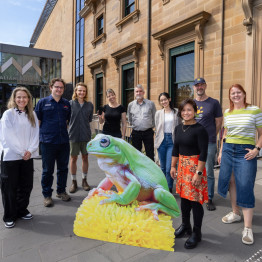
Australia has 254 known species of frog. Many are experiencing alarming declines, exacerbated by disease, habitat loss, pollution, and climate change.
The FrogID app was designed to optimise frog acoustic data collection with high scientific accuracy. It is a free, dynamic field guide to Australia’s frogs and is a biodiversity monitoring tool. Individuals use the app to deepen their understanding of local wildlife, and communities use it to engage with nature and build an appreciation for biodiversity conservation.
FrogID is an invaluable tool for engaging the public and exhibiting the power of citizen science in capturing data for meaningful scientific outcome.
James Meehan High School - Middle school initiatives
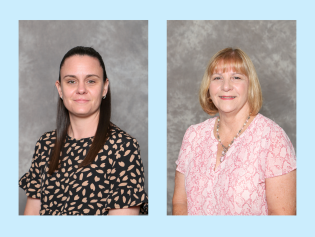
In 2020, James Meehan High School grappled with plummeting enrolment from feeder primary schools. To remedy this, they implemented the James Meehan Cup transition program aimed at smoothing the path from primary to secondary education.
This program included academic competitions, gala days, school visits, and a collaborative approach to address literacy and numeracy gaps. It also showcased the school’s facilities and programs to prospective families, students, and teachers.
Now in its fourth year, the James Meehan Cup has seen a remarkable surge in community involvement, resulting in a 50% increase in the enrolment over the past four years and NAPLAN results reflect the highest growth in a decade.
Partners: Macquarie Fields Community of Schools
Sustainable Healthcare - Together towards Zero 2030
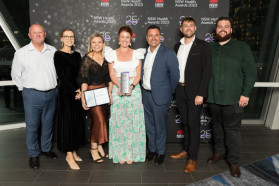
Healthcare is responsible for 7% of Australia’s CO2 emissions. Hunter New England Local Health Districts ‘Sustainable Healthcare: Together Towards Zero’ initiative is a pioneering strategy aiming for carbon and waste neutrality by 2030, a first for any Health Service in the country.
Focused on 6 key areas of Energy, Waste, Water, Transport, Procurement, and Infrastructure, the initiative sets annual targets supported by robust governance and data-driven approaches. In its first 3 years, significant achievements have been made, including 31% reduction in CO2 emissions, 39% of rainwater capture and recycling, 24% diversion of general waste from landfill and recurrent savings of $3.3 million.
The Number that Changed my Life
There are significant barriers to seeking help for gambling problems within culturally and linguistically diverse (CALD) communities. They include a lack of recognition of harm, high levels of stigma and a low awareness of support services as well as a range of cultural nuances individual to each community.
The Number that Changed my Life is a culturally driven campaign designed to directly and specifically speak to key CALD communities in NSW, through 6 targeted, in-language campaigns.
The campaigns use an unmissable strategy underpinned by an extensive community engagement program to combat the reluctance of some individuals to recognise that gambling can be an issue.
The campaign has been recognised as setting a best practice standard for CALD problem gambling campaigns, being adapted by other jurisdictions and winning multiple awards.
Yarkuwa Indigenous Knowledge Centre
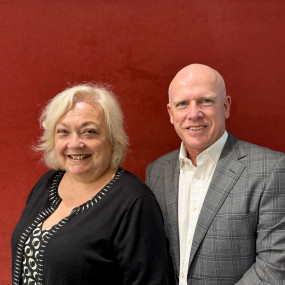
The Yarkuwa Indigenous Knowledge Centre in Southern NSW needed to find a new location. Recognising the opportunity to use a surplus government property, Property and Development NSW supported Yarkuwa under the Government’s Community Use Policy. They also worked with them to secure Create NSW grant funding and support from the local council and the Member for Murray.
This project supports the NSW Government’s Closing the Gap targets, providing Yarkuwa with a permanent location for their cultural collection, and ensuring the practices of the Wamba Wamba and Perrepa Perrepa people will be preserved for future generations.
Partners: Yarkuwa Indigenous Knowledge Centre
Driving public sector diversity
Early Birds & Night Owls
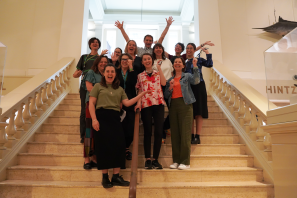
Families of children with sensory sensitivities were an underserved audience by the Australian Museum. Following a successful pilot program that provided equitable museum access to these families, sensory friendly mornings were expanded to include adults at night.
The program aims to develop and foster self-determination, independence and social connections for those with autism and sensory sensitivities. The Australian Museum is committed to driving change across NSW, nationally and internationally and have shared their training resources with other museums and galleries.
Essential worker attraction program
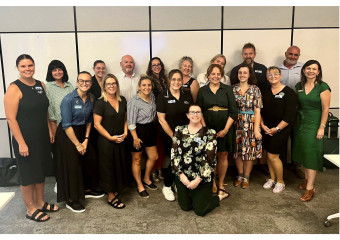
With a lack of essential workers across towns in regional NSW impacting community access to essential services, the team developed a number of solutions to attract and retain key workers. The team provided support to help new workers relocate and settle in regional areas by connecting them with local people and resources to make them feel at home. Since commencing the program over 50 essential workers have moved to regional towns, leading to one primary school being fully staffed for the first time since 2019.
People Purpose Passion: Transforming Aboriginal Employment
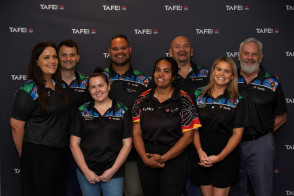
With a broad footprint of over 150 locations across NSW, the TAFE NSW Aboriginal Employment Team identified a unique opportunity to connect with communities to boost Aboriginal employment outcomes.
The team consulted and collaborated to develop an Aboriginal Employment Strategy to shift focus from statewide to local, from compliance to opportunity. The new strategy is already showing impressive results with an 11% increase in Aboriginal staff since March 2023, accelerating progress towards a more diverse, equitable and inclusive workplace.
Workplace Adjustment Passport
Employees with disability faced challenges in recording their workplace adjustments and when they moved roles would need to tell their story repeatedly, leaving them feeling vulnerable. The workplace adjustment passport system allows employees to store their adjustment details confidentially, and easily update them at any time, in a place their manager can access. Since being introduced, over 150 employees have workplace adjustment passports in place. This model is now being adopted by other NSW government agencies, facilitating mobility of employees between agencies.
Excellence in service delivery
Domestic Violence Unit
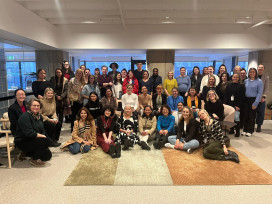
A woman is killed every 4 days in Australia. The NSW Police respond to over 144,000 domestic violence related incidents annually with a domestic violence related call every 4 minutes.
The Domestic Violence Unit is a positively evaluated specialist state-wide interdisciplinary team of lawyers, case workers, mental health workers and financial counsellors who work together to help victim-survivors of domestic and family violence. In 2022-23, the Domestic Violence Unit provided over 11,430 services to clients experiencing domestic and family violence across NSW.
Howlong Community Emergency Response Team
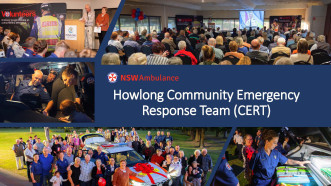
With a population of 2,551 the Howlong community is too small to sustain a paramedic station. To ensure the community have access to adequate emergency care the Howlong Community Progress Association worked with NSW Ambulance to establish a Community Emergency Response Team for the area. The response team are a unit of trained volunteers that provide initial clinical care prior to the arrival of paramedics.
Community members underwent a rigorous assessment process before commencing 9 months of induction training with paramedics. To date the 10 volunteers have responded to 95 Triple Zero (000) calls.
Partners: Howlong Community Progress Association Inc.
Kalgal Burnbona School-Based Integrated Care
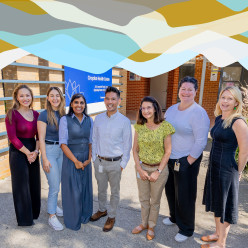
The Kalgal Burnbona is care model that provides holistic medical and social care in a school setting. It addresses the unmet physical and mental health needs of children with poor access to healthcare, an issue that has an inequitable effect on Aboriginal children.
The Kalgal Burnbona model has been implemented across 9 schools in NSW. Of that student population 82% received referrals to counselling, 43% to behaviour related care, 43% to youth health care and 20.5% to paediatric care. An additional 4 schools will be added to the program in 2024.
The Kalgal Burnbona model has been shown to improve access to culturally safe health care with positive outcomes for students, families and staff.
Reducing the impact of fines for Out of Home Care youth
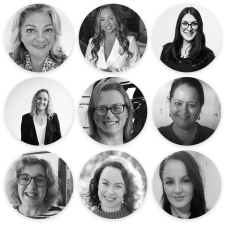
Out of Home Care youth represent around 10.5% of under 18 year-olds in the fines system. Research shows a correlation between low-level fines not being resolved by teenagers and recidivism into more serious fines as adults. There is a low level of understanding among this age group on the impact of fines and how to resolve them.
In partnership with Department of Communities and Justice, Revenue NSW delivered innovative approaches to specialised debt resolution pathways and supported caseworkers to understand consequences of fines debt for Out of Home Care youth transitioning into adulthood. Over 335 youth have directly benefited from this work.
Partners: Department of Communities and Justice
Royal Prince Alfred Hospital School
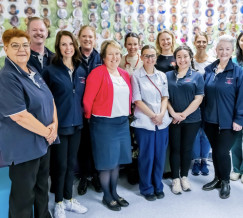
Principal Wendy Barwell and her team transformed the educational provision available to students during short-term hospital stays at Royal Prince Alfred Hospital.
They created online learning programs, data analysis systems, and individualised learning plans for all students, which are reported to census schools, every lesson, every day. They challenged the misconception that educational support is not necessary in a short-term stay in hospital.
This impressive collaborative transformation has led to the strengthening of relationships with students, carers, NSW Health colleagues and local schools.
The Bowe Kerb
Transport for NSW
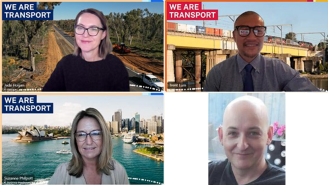
Installation of redirective kerbs, a safety device used to control errant vehicles, reduces the risk of a vehicle leaving the roadway. The Bowe Kerb effectively and safely redirects errant vehicles at up to 80km/h. Previous designs had limited capacity at 50km/h and did not have capacity to redirect larger, heavier vehicles such as SUVs and utility vehicles.
The Bowe Kerb is the new Australian standard for redirective kerbs, it can be applied to all future projects and installed across the country.
Highest quality healthcare
Mindgardens Functional Neurological Disorders Clinic
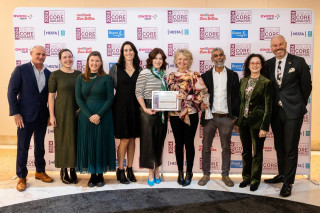
Patients with functional neurological disorders (FND) are often likely to suffer other health issues including anxiety, depression and physical health burdens. The Mindgardens FND Clinic provides multidisciplinary assessment and intervention for FND patients. This small team has developed a successful, cohesive and resource-efficient model of care that is having significant positive impacts on clinic patients.
Partners: Mindgardens and the Centre for Healthy Brain Ageing (CHeBA), University of New South Wales
NSW Medicines Formulary
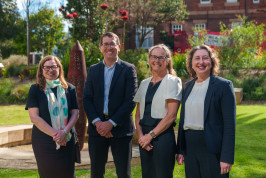
This collaborative program has leveraged health expertise across the state, initiating reforms to address equitable patient access to medicines. The digital, statewide solution to medication management and procurement processes promotes consistent, efficient healthcare delivery. Since launch the formulary has delivered almost $100 million in savings.
Partners: NSW Ministry of Health, HealthShare NSW and eHealth
NSW virtualKIDS Urgent Care
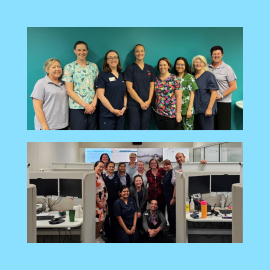
This program was developed to provide equitable access to specialised paediatric virtual urgent care services to children across NSW. It recognised the need to provide alternative healthcare services closer to home for children & families, reduce emergency department presentations, increase equity access to care across NSW and ensure positive experiences for patients and their families. The virtual service has resulted in high satisfaction from families who have needed to use it.
Partners: Healthdirect and Hunter New England Local Health District
RPA Virtual Wound Care Command Centre
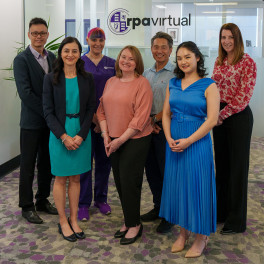
Chronic wounds significantly strain healthcare systems with high readmission rates and costly outpatient services. Disjointed care exacerbates patient suffering and increases healthcare burdens.
The Wound Care Command Centre, within Australia’s first virtual hospital, leverages an artificial-intelligence wound app for immediate specialist services. This service dramatically reduces wait times, readmissions and hospital stays, enhances communication, and ensures consistent, high-quality care across geographic boundaries.
Refugee Cancer Screening Partnership Project
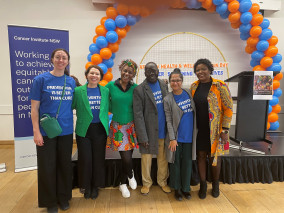
Cultural taboos surrounding cancer inhibit open dialogue and hinder proactive screening behaviours. The Cancer Institute NSW led the Refugee Cancer Screening Partnership Project to understand and address their barriers to cancer screening.
Following community consultation, culturally appropriate interventions were implemented to enhance cancer literacy, leading to community members agreeing to participate in cancer screening. These interventions have also influenced a more inclusive and accessible screening environment.
Partners: Settlement Council of Australia, Illawarra Multicultural Services, Mosaic Multicultural Connections, Metro Assist Inc, NSW Service for the Treatment and Rehabilitation of Torture and Trauma Survivors, NSW Refugee Health Service and Western Sydney University
World class education and training
Birrany and Mulungan Program
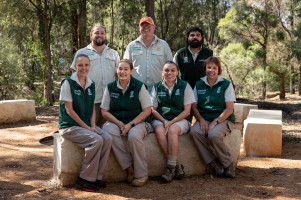
The Birrany and Mulungan Business Program increases a sense of pride in young Indigenous people, provides higher levels of engagement in education, enhances skills for employment and encourages academic qualifications. This unique program uses the combination of an immersive zoo experience, supportive blame free environment and qualified educators to address and reframe student relationships with education. Participants graduate with pathways to employment or further training, increased engagement with school education and momentum to overcome the patterns of disadvantage.
Partners: NSW Office of Regional Youth and Transport NSW
Endeavour Sports High School - Improving Educational Outcomes
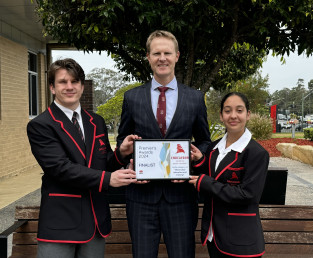
A decade ago, Endeavour was losing a significant number of enrolments and underperforming academically. The school developed and implemented its ‘High Expectations Policy’ to address attendance, behaviour, attitude to learning and commitment to school values. Today Endeavour is achieving remarkable academic, sporting, creative & performing arts and extra-curricular success. The community has recognised this resulting in almost double the enrolments
NEXTGen Clinical Volunteer Induction Training
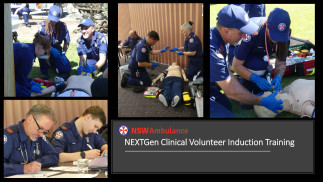
NSW Ambulance clinical volunteers are spread across 60 locations in NSW and provide immediate clinical care to patients prior to the arrival of paramedics. Clinical volunteers need to complete an induction program before they can respond and provide critical care to patients in their local communities. Their training course was redesigned to allow students to begin responding under supervision with an escalating scope of practice, ensuring their skills and knowledge were consolidated progressively. This revised program has increased the confidence and competency of clinical volunteers.
Partners: Clinical Excellence Commission
Paid to Learn
TAFE NSW

In 2023 Paid to Learn trained 140 new teachers who contributed over 27,000 teaching hours. By alleviating teacher shortages and producing qualified, confident, and current teachers, more learners can pursue their own educational and career pathways.
Twelve Northern Rivers schools - Initiatives to Support Flood Recovery
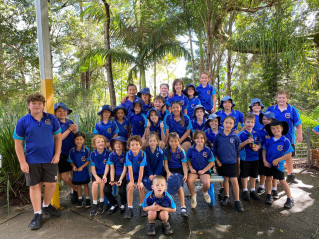
Twelve schools in the rural northern NSW region worked together to address student wellbeing needs to provide support during natural disaster response and recovery. Specialised programs were implemented across schools to promote a strong sense of belonging and increase school attendance.
Together the schools took a flexible, innovative and collaborative approach to build strong community relationships and ensure every child had access to a quality education at a time of great need.
Partners: Richmond Principal Network, Lennox Coast Principal Network, Tweed Coast Principal Network, Wollumbin Principal Network, and Lismore Principal Network
Vocational Education and Training in School Program
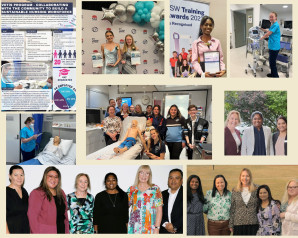
Nursing shortages are a critical issue for local communities. This program established and invested in a pipeline program to address predicted shortages by creating health career pathways for high school students. The collaboration between the healthcare and education sectors provides students with vocational skills and practical experience and generates a potential pool of applicants for Assistant in Nursing positions. The program prepares students for nursing roles through hands-on experience, mentorship, and alignment with industry standards in the area where they live and attend school.
Partners: Department of Education and NSW Health Registered Training Organisation